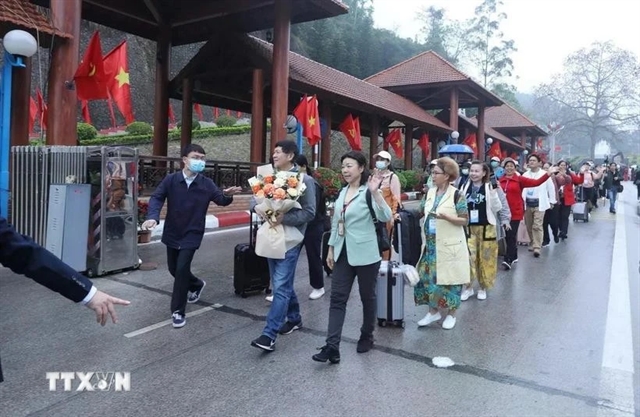In her article posted on the Global Times of China, Liu Xiangyan, associate researcher of the Institute of International Studies at the China Tourism Academy, wrote that with the improvement of transportation networks and enhanced regional cooperation, the two countries have become each other's major markets of tourist sources.

Chinese tourists entering Việt Nam through Hữu Nghị International Border Gate, Lạng Sơn. — VNA/VNS Photo
BEIJING — Along with the cultural similarities such as Chinese characters, Confucianism, and traditional customs and festivals, increasingly close tourism exchanges between China and Việt Nam have served as effective tools to strengthen the relationship between the people of the two countries, according to a Chinese expert.
In her article posted on the Global Times of China, Liu Xiangyan, associate researcher of the Institute of International Studies at the China Tourism Academy, wrote that with the improvement of transportation networks and enhanced regional cooperation, the two countries have become each other's major markets of tourist sources.
She cited official statistics from both countries, showing that in 2024, Việt Nam welcomed over 3.7 million Chinese tourists. In the first quarter of 2025, China surpassed the Republic of Korea to become Việt Nam's largest source of foreign tourists.
The connection of rail and road networks at border crossings such as Hekou and Dongxing has significantly improved the efficiency of cross-border tourism. At these key border gates, new tourism routes for self-driving cars have been launched, allowing Chinese tourists to easily travel between two countries in one day. Additionally, with the resumption of the Beihai-Hạ Long cruise route at the end of 2024, Chinese and Vietnamese tourists now have a new option to explore both countries by cruise.
On October 15, 2024, the Bản Giốc (Việt Nam) - Detian (China) Waterfall site officially began operations, marking it the first cross-border tourism cooperation zone in China. It is expected to not only accumulate practical experience for other cross-border tourism zones but also continue to support the development of border tourism between the two countries, Liu wrote.
In addition, the two countries continue to optimise customs and visa policies. Thanks to more convenient customs procedures at many border crossings, the cross-border tourism market has remained vibrant. Last year, the number of people going through the Dongxing border gate exceeded 8.58 million, a year-on-year increase of 54.6 per cent, making it the busiest border gate in the country.
On February 25, the Dongzhong (China)-Hoành Mô (Việt Nam) Port travel inspection channel officially opened, providing a new channel for cross-border tourism, economic and trade exchanges, and family visits.
Since February 10, China has implemented a visa exemption policy for ASEAN tourist groups entering Xishuangbanna, Yunnan. Along with the previous visa exemption policy for ASEAN tourist groups entering Guilin, Guangxi, Vietnamese tourists traveling in groups can now visit Guilin and Xishuangbanna, two popular tourist destinations, without the requirement for a visa.
Meanwhile, Việt Nam introduced a visa exemption policy to foreign visitors to Phú Quốc Island in July 2020 and launched an e-visa system in August 2023. These measures have also enhanced the convenience for Chinese tourists entering Việt Nam.
According to the author, 2025 marks the 75th anniversary of the establishment of diplomatic relations between China and Vietnam and is designated as the "China-Việt Nam Year of Humanistic Exchanges." In the context of high political trust and closer economic and trade cooperation, cultural exchanges, especially those between the youth, have become more frequent. Many Chinese films and TV shows have become hot topics among young people in Việt Nam, and an increasing number of Vietnamese pop songs are being widely shared on Chinese social media platforms.
The expert proposed the two countries strengthen cooperation in cultural and creative industries such as film, television, gaming, and music, to enhance mutual understanding between the two countries' people and strengthen broader public connections.— VNA/VNS